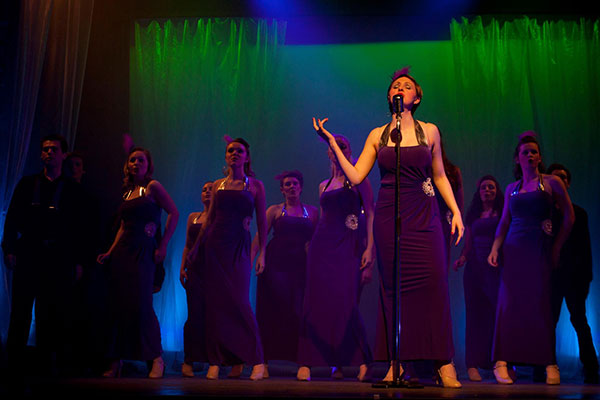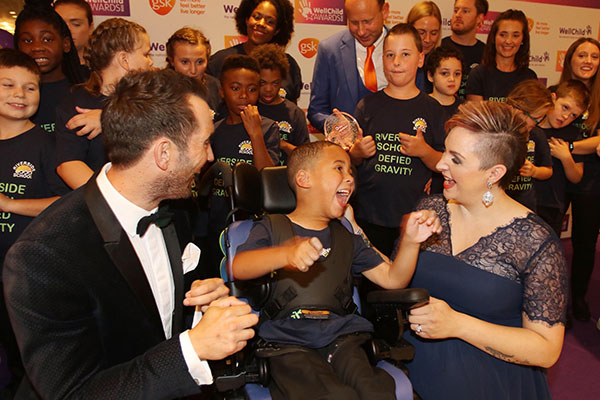Rachel Mason has a superpower, she can taste and see music, but it’s her charity work that makes her a superhero.
You might have heard the term ‘slashie’; as in “I’m a designer/copywriter/project manager.” Well, it’s a term that the 2019 IPSE Freelancer of the Year Rachel Mason takes to the extreme. What else can you say about someone who’s a songwriter/performer/singing teacher/musical arranger/vocal judge/charity ambassador – oh, and did I mention mum of two young children?
No, Rachel hasn’t (as far as I can tell) bought a Harry Potter-style time turner: she’s just one remarkable freelancer. And she’s had huge success right across music – and the world.
Rachel’s been a judge on Sky One’s Sing: Ultimate A Cappella, a talent competition for unaccompanied singers. She’s worked with artists from Gregory Porter to The Vamps. She was the musical director of the UK’s top show choir, Euphoria. She’s judged countless international singing competitions, including The Voice Festival, Masters of Show Choir and the ICCAs (International Championship of Collegiate A Cappella).
When I look back over that list, I feel enormously lucky Rachel has the time to speak to me at all (I catch her during her children’s naptime). So, where to begin? Well, how about how someone sets out on the path to becoming the ultimate music guru?
When I’m songwriting with somebody, when the song is going really well and feels really good,
it tastes like steak.
The superhero backstory
You might expect the obvious backstory: Rachel loved music ever since she was a little girl. Well, yes, she did. But she was also born with something of a superpower: when she hears music, she sees colours. She can even taste music. It’s called synaesthesia, which literally means ‘together sensation’.
About four per cent of the UK have some kind of synaesthesia, meaning for them, one sense automatically triggers another. It’s a condition that comes in many forms, but you find sound-related synaesthesia among many top musicians. As Rachel tells me: “Quite famous musicians like Pharrell Williams, Billy Joel and Tori Amos – a lot of them have it.
“I often refer to it as my superpower. It’s not particularly useful: I can’t heal people or fly or be invisible, but I see music as colour, which can be quite useful.”
It certainly must give people a different perspective on life. As Rachel says: “As a child, I thought everybody had it. Because you don’t realise you’re different until you say it to someone and they look at you blankly thinking you’re a bit weird.
“I told my parents about it, saying ‘Well when I hear Albatross [the instrumental track by Fleetwod Mac], it’s yellow,’ and they just looked at me really strangely.”
Perhaps the strangest (and most super) thing about it is the taste: “When I’m songwriting with somebody, when the song is going really well and feels really good, it tastes like steak. It’s really weird – I only ever get it with steak.” With apologies to any vegetarians out there, tasting steak again and again doesn’t sound at all bad to me.
In the beginning
So, back to that backstory: aside from her time turner, how did Rachel become an international music guru? Well, it all starts with Glee…
After she graduated with a degree in music, Rachel said, “I hated my admin job so much that I decided to contact lots of local schools to find out if they would have a singing teacher come in and do some private lessons there. Luckily, a couple of schools said yes, so I was able to build up my client base.
“I had so many teenage students, and it was back in 2009/2010 when Glee was massive. So, a professional dancer colleague of mine and I decided to set up our own Glee club. I had so many students from different schools, we thought we’d do it as a separate thing on a Saturday. That way people who were a bit older could be part of it too. Because Glee was so big then, it took off really quickly.
And so, Euphoria was born, and Rachel’s career was changing fast: “Before long, we were invited to be part of the Britain’s Got Talent tour with Spellbound, the acrobats. Then we got talent-spotted to go and perform in New York. And we did the Royal Albert Hall. And it just kind of snowballed. It was incredible, really.”

Ready for take-off
From there, Rachel’s career really took flight (even if she claims that isn’t one of her superpowers): “We did so many different things with the choir, performing all over the place. And from that I got in contact with a lot of other show choirs and show choir competition organisers all over the world (it’s huge in the US and Canada, where show choir is from).
“People started asking me to mentor their choirs and come over to do things with them, which was incredible. I just thought, “Oh my goodness, I’m British – you’re the experts!” But they just seemed to love the arrangements I wrote for Euphoria.
“From there, I started to do a lot more a cappella work, and before long I was invited to judge The Voice Festival and the ICCAs, which is the competition featured in Pitch Perfect. Eventually, because I was so hugely into the a cappella world, I was basically headhunted to be one of the judges on Sky One for Sing: Ultimate A Cappella.
“It was the most amazing and crazy experience because I had a three-month-old baby at the time. We were all in London and they would go off for the day, while I went to the studio and was filming with the Vamps and Gregory Porter, and Cat Deeley, who hosted the show.
Singing up a storm
That’s two or three of the strings in Rachel’s creaking bow, but there’s one big area we haven’t covered: songwriting. After all, as well as her many musical arrangement plaudits, Rachel also has a master’s in songwriting. It’s always been one of her biggest passions in music, she tells me: “I’ve written songs for as long as I can remember. I think I was four when I wrote my first song (it probably wasn’t very good!).
“Then when I was doing my music degree, I would spend evenings in a recording studio recording my own songs. Then I wrote a lot of things for my show choir, so we recorded an album of things I’d written.”
Then, while leading Euphoria, Rachel (typically) decided that she wasn’t doing quite enough: “I decided I wanted to learn more about songwriting, so I very luckily got a place doing a master’s in songwriting at Bath Spa University. I did my master’s over two years part-time while I worked.
“That gave me the confidence to feel I could really do it properly. So, I started to co-write with lots of different singers and songwriters. Now I run a songwriting academy as part of my artist management business. I write with a lot of different artists who are just being discovered, doing BBC introducing and getting lots of radio play.”
Rachel is characteristically humble when talking about the many high-profile performers she has worked with, but she has, she tells me, “worked with some of the winners of The Voice UK”.
She also said: “My co-writer and I have written a song for Dua Lipa too: she hasn’t used it yet, but we have written one for her.”

Ghosts
When discussing her stellar career, Rachel is always not only humble, but effusive about all the people she has worked with. It’s the kind of near-saintly behaviour you might expect from someone who has also dedicated a huge amount of her time to charity work. One of her biggest causes is campaigning against bullying.
In 2013, she wrote the award-winning anti-bullying anthem Body on Mute, which she and her choir performed around the world, and which was adopted first by the charity Beat Bullying, and then by the Diana Trust. Its lyrics have even been used for an American Apparel range.
She tells me: “I was teaching a young boy at school, who was a really talented singer, but he started to get really down in his lessons. He’d just stop being himself: he was a really bubbly little kid and he just started to get more and more down and then he stopped coming to singing lessons.
“I rang his mum and she said he was being really badly picked on by some boys at school, because he liked singing. She said he’d stopped everything – he’d stopped playing football – he’d just stopped doing all the things he used to. He’d basically become a ghost of himself.
“It was so sad. I remember thinking out loud, ‘He’s become a ghost of himself…’ and I wrote the song based on that idea that someone could be bullied so badly that they stop being themselves. He inspired that song.”
But what happened to the little boy? How did he react to the song?
“I haven’t spoken to him since then – it was a long time ago. But he told one of my other students that he’d listened to it and it made him cry. They said he realised he didn’t want to be a ghost any more – he wanted to be himself, and he’s a lot more confident now.”
The Freelancer of the Year
Rachel said she believes her anti-bullying anthem and the impact it had is one of her greatest successes. It’s easy to tell she’s also over the moon about being named Freelancer of the Year. For her, it’s “one of the most amazing things that’s ever happened to me”.
“I never thought it was going to happen. I kept saying to everybody, ‘I’m off to London, I’ve got some new shoes and I’m going to get an evening with my husband, so that’ll be nice. I’m not going to win though.’
“I just wanted to go and have a nice time and see all the other finalists, and then I won and there’s a photograph of me going up on stage and I just look completely shell-shocked. I couldn’t believe it.”
For Rachel: “Being self-employed means that you don’t really ever get a pat on the back – you don’t get your boss saying, ‘You’re doing really well, you’re hitting all your targets: have a pay rise’.
“It’s such a career boost to think that these people think you’re that good,” she added. “As freelancers, we don’t tend to think that of ourselves: we think we’re decidedly average.”
But, as I’m sure you’ve realised by now, even if she doesn’t really have superpowers, Rachel Mason, the 2019 Freelancer of the Year, is anything but average.






